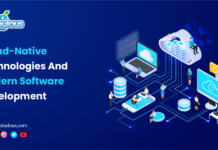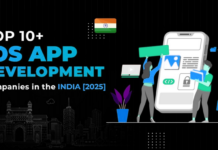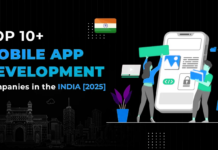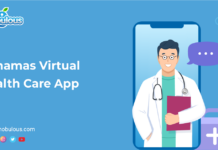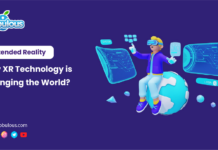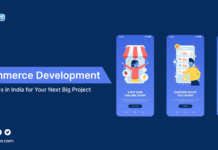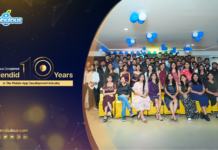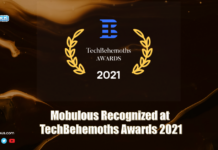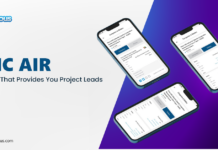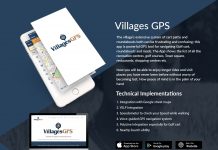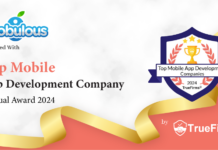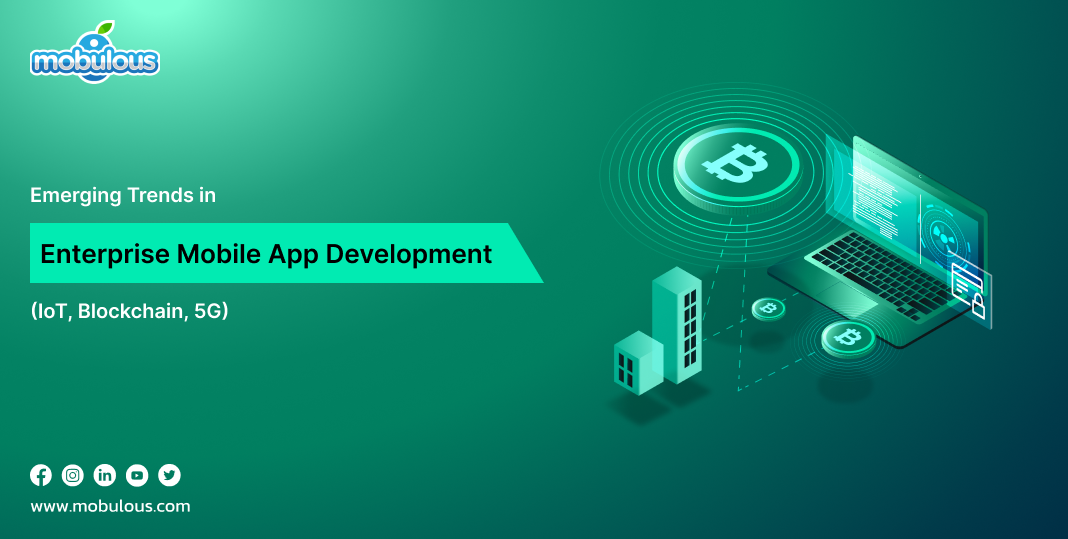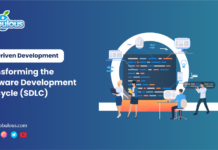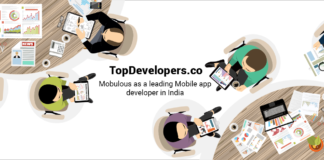Emerging Trends in Enterprise Mobile App Development (IoT, Blockchain, 5G)
Emerging trends in enterprise mobile app development are witnessing a transformative confluence of revolutionary technologies. The integration of the Internet of Things (IoT) allows for seamless connectivity between mobile apps and smart devices that creates unparalleled opportunities for automation and data collection.
Blockchain technology is revolutionizing transparency and security in enterprise apps that offer steadfast record-keeping and smart contract capabilities. The rollout of 5G networks is dramatically improving app performance with ultra-low latency and lightning-fast data speeds, allowing for real-time processing and rich multimedia experiences.
These technologies, i.e., IoT, blockchain, and 5G are reshaping how enterprises approach mobile application development and drive competitive advantage and innovation in the digital marketplace. Let’s move ahead and learn all about emerging trends in enterprise mobile app development comprehensively!
For Query:- Seek Guidance From an iOS App Development & Android App Development Company!
What is Enterprise Mobile App Development?
Enterprise mobile app development is the methodology of developing mobile apps specially designed for large organizations’ business workflows and operations.
These applications are customized to meet complex corporate necessities that focus on scalability, security, and integration with existing business systems.
They serve diverse purposes, from employee productivity and internal communication to customer relationship management and data analytics.
Unlike consumer apps, enterprise mobile apps prioritize compliance, functionality, and smooth integration with corporate infrastructure while maintaining strict security protocols.
Emerging Trends in Enterprise Mobile App Development
The landscape of enterprise mobile app development is quickly evolving with three major technological innovations and reshaping how businesses approach their mobile solutions. These emerging trends of app development are transforming conventional business processes and developing new opportunities for overall enterprise efficiency and growth.
1. IoT
Internet of Things or IoT integration in enterprise mobile applications is revolutionizing business operations through connected devices and sensors. These applications now serve as central control hubs, handling and monitoring IoT devices across manufacturing warehouses, floors, and office spaces.
Real-time data collection allows for predictive maintenance, automated workflow optimization, and inventory tracking. IoT-enabled enterprise mobile applications are driving operational efficiency and providing valuable insights through data analytics.
For Query:- Seek Guidance From an IoT App Development Company!
2. Blockchain
Blockchain technology is improving enterprise mobile apps with unparalleled transparency and security features. Organizations are utilizing blockchain for smart contracts, secure transactions, and immutable audit trails.
This technology ensures data integrity and reduces fraud risks in supply chain management, document verification, and financial transactions. Blockchain integration is relatively beneficial for industries requiring tamper-proof and transparent record-keeping systems.
For Query:- Seek Guidance From a Blockchain App Development Company!
3. 5G
The implementation of 5G networks is transforming enterprise mobile applications with ultra-fast connectivity and minimal latency. This allows for real-time data processing, augmented reality apps, and improved video conferencing in enterprise environments.
5G technology supports more connected devices simultaneously, allowing for robust IoT implementations and improved mobile edge computing capabilities. This advancement is essential for apps requiring quick data processing and transmission.
The Impact of IoT on Enterprise Mobile App Development
The integration of the Internet of Things (IoT) with enterprise mobile apps has transformed fundamentally how businesses operate, make decisions, and collect data. This convergence creates robust solutions that bridge the digital and physical worlds. Let’s understand all about IoT and why it matters, its benefits, and real-world use cases in a detailed way:
What is IoT and Why Does it Matter?
IoT refers to a network of interconnected physical devices embedded with software, sensors, and connectivity capabilities that allow them to gather and exchange data.
In enterprise contexts, the Internet of Things matters because it provides real-time insights, enables data-driven decision-making, and automates processes.
This technology creates a seamless ecosystem where devices communicate and interact autonomously, thus enhancing productivity and efficiency.
Key Benefits of IoT in Enterprise Apps
The integration of IoT or the Internet of Things with enterprise mobile apps delivers significant advantages that transform business operations and create new opportunities for efficiency and growth. Below are the benefits of IoT in enterprise applications:
1. Enhanced Data Collection and Analytics
IoT sensors and devices generate ample amounts of real-time data that enterprise applications can gather, process, and examine. This continuous stream of information allows businesses to identify patterns, optimize operations, and predict maintenance needs.
Advanced analytics tools within these applications transform raw data into actionable insights, enabling organizations to make informed decisions and enhance overall performance.
2. Improved Operational Efficiency
By automating routine tasks and monitoring processes in real-time, IoT-enabled enterprise mobile applications significantly reduce manual intervention and human error.
These systems can automatically adjust operations, depending on sensor data, smooth workflows, and optimize resource utilization. This automation leads to boosted productivity, more effective usage of resources, and reduced operational costs.
3. Better Asset Management
IoT or Internet of Things integration allows for precise tracking and monitoring of business assets through enterprise mobile applications. Firms and organizations can monitor equipment health, enforce predictive maintenance schedules, and track location and usage patterns.
This proactive methodology reduces downtime, optimizes maintenance costs, and extends asset lifespan while ensuring optimal performance.
4. Enhanced Security and Monitoring
IoT or Internet of Things devices coupled with enterprise applications provide comprehensive security solutions through continuous monitoring and quick alerts.
From access control to environmental monitoring, these systems offer real-time surveillance and automated response mechanisms. This integration ensures better protection of physical assets and data while enabling quick response to security incidents.
5. Improved Customer Experience
IoT integration allows for enterprise mobile applications in order to deliver personalized experiences by gathering and examining customer interaction data.
These systems can anticipate customer needs, provide proactive support, and automate service delivery. The outcome is improved customer satisfaction, more efficient customer relationship management, and boosted loyalty.
Real-World Use Cases of IoT in Enterprise Apps
The practical applications of IoT in enterprise mobile apps span diverse industries, demonstrating the versatility and transformative power of this technology in real-world scenarios. The real-world use cases of IoT in enterprise apps are given below:
1. Logistics & Inventory Management
IoT-enabled enterprise applications revolutionize supply chain management through real-time tracking and automated inventory systems. Smart sensors monitor stock levels, optimize warehouse operations, and track shipments.
These apps allow for predictive inventory management, reduce stockouts, and enhance delivery efficiency, through real-time route optimization and condition monitoring of sensitive goods.
2. Healthcare
In healthcare settings, IoT-integrated enterprise applications monitor patent essential signs, manage medication schedules, and track medical equipment. These apps allow for automated medical record updates, remote patient monitoring, and real-time emergency response systems.
Healthcare and hospitality service providers can access essential patient data instantly and make informed decisions about patient care.
For Query:- Seek Help From a Healthcare App Development Company!
3. Smart Offices
Smart office solutions utilize IoT-enabled enterprise applications in order to manage building systems, improve employee productivity, and monitor workspace utilization.
These apps control temperature, lighting, and security systems while tracking occupancy patterns and energy usage. The integration enables automated facility management, enhanced energy efficiency, and improved workplace safety protocols.
Blockchain in Enterprise Mobile Apps
Blockchain technology is revolutionizing enterprise mobile apps by introducing unparalleled levels of transparency, security, and decentralization. This ingenious technology is transforming how businesses manage data, handle transactions, and ensure trust in digital operations.
So, without any further ado, it’s time to discuss blockchain, its benefits, and enterprise use cases comprehensively:
What is Blockchain and How Does it Work?
Blockchain is a distributed ledger technology that creates an immutable chain of data blocks, each containing transaction records or other information. It operates on a peer-to-peer network where each participant maintains a copy of the ledger.
New transactions are validated through consensus mechanisms that ensure data integrity and eradicate the necessity for intermediaries. This decentralized structure makes the system highly transparent and secure.
Benefits of Blockchain for Enterprise Apps
The integration of blockchain technology in enterprise mobile apps offers substantial advantages that improve efficiency, security, and trust in business operations. The key benefits of blockchain for enterprise app development are mentioned below:
1. Enhanced Security and Privacy
Blockchain’s cryptographic foundations provide robust security for enterprise mobile applications. Each transaction is linked and encrypted for enterprise mobile apps which makes data tampering virtually impossible.
The decentralized nature eradicates single points of failure, while smart contracts automated security protocols, ensuring confidential business data remains secure while maintaining transparency where required.
2. Improved Transparency and Traceability
Each transaction on the blockchain is recorded in an immutable and permanent ledger accessible to authorized participants. This creates an unalterable audit trail that allows businesses to track assets, processes, and transactions with complete confidence.
Transparency helps prevent fraud, build trust, and ensure compliance among stakeholders while maintaining data integrity, providing robust solutions of blockchain in app development.
3. Reduced Operational Costs
Eradicating intermediaries and automating processes through blockchain and smart contracts significantly reduces operational expenses.
The technology simplifies verification processes, reduces the need for manual reconciliation, and reduces paperwork. This automation leads to faster transaction processing and fewer resources needed for administrative tasks.
4. Enhanced Trust and Collaboration
Blockchain builds a trusted environment for business interactions without requiring intermediaries. The consensus mechanism ensures all participants agree on the state of transactions, while smart contracts automatically implement agreed-upon terms.
This builds confidence among business partners and enables new forms of collaboration across organizational boundaries.
5. Real-time Settlement and Processing
Blockchain allows for near-instantaneous settlement of transactions and real-time processing of business logic through smart contracts.
This eradicates delays in conventional processing systems, provides quick visibility into transaction status, and reduces the risk of errors in transaction status. The result is enhanced cash flow and more effective business operations.
Enterprise Use Cases of Blockchain in Mobile Apps
Blockchain technology is being enforced across diverse industries through enterprise mobile apps that deliver ingenious solutions to conventional business challenges. Below are the robust enterprise use cases of blockchain in mobile apps:
1. Financial Transactions
Blockchain-enabled enterprise applications revolutionize financial operations by fostering secure and instant transactions without intermediaries. These mobile apps manage everything from cross-border payments to internal fund transfers with reduced fees and improved security.
Smart contracts automate complex financial processes, ensuring compliance while providing real-time settlement and transparent transaction tracking.
2. Supply Chain Management
Enterprise mobile apps utilizing blockchain provide comprehensive visibility in supply chain operations. These apps track products from origin to destination, maintain immutable records of handling conditions, and verify authenticity.
The technology allows for real-time monitoring of shipments, quick detection of supply chain disruptions, and automated compliance verification.
3. Identity Verification
Blockchain-based identity verification in enterprise applications offers effective and secure user authentication. These mobile apps build immutable digital identities, enable secure access control, and simplify KYC processes across organizational boundaries.
The decentralized nature of blockchain technology ensures privacy while enabling quick verification of permissions and credentials.
The Impact of 5G on Enterprise Mobile App Development
The introduction of 5G technology observes a significant shift in enterprise mobile app development that enables unparalleled speeds, massive device connectivity, and minimal latency. This revolutionary network infrastructure is reshaping how businesses design and deploy mobile apps. Let’s learn all about 5G, its advantages, and different use cases efficiently:
What is 5G and Why is it a Game-Changer?
5G is the fifth generation of mobile network technology that offers speeds up to 100 times faster than 4G, the potential to connect millions of devices, and ultra-low latency simultaneously.
For enterprises, 5G represents a quantum leap in connectivity that allows for real-time data processing, support for emerging technologies, and smooth multimedia streaming like IoT and AR/VR at scale.
Benefits of 5G for Enterprise Mobile Apps
The implementation of 5G technology brings transformative benefits to enterprise mobile apps, fundamentally changing how businesses interact and operate with their digital infrastructure. The essential benefits of 5G for enterprise mobile apps are mentioned below comprehensively:
1. Enhanced Performance and Speed
The ultra-high bandwidth of 5G allows enterprise mobile applications in order to process and transfer amounts of data at unparalleled speeds.
This dramatic improvement enables real-time streaming of quick file transfers, high-definition content, and smooth communication between connected devices. Enterprise mobile apps can now manage complex operations without lag, enhancing user productivity and experience.
2. Ultra-Low Latency
5G’s near-zero latency of 5G networks allows for truly real-time apps and quick response times. This breakthrough enables enterprise applications to support crucial operations requiring instant feedback, including autonomous vehicles and remote control systems.
The reduced delay time is essential for apps where milliseconds matter, like industrial automation or financial trading.
3. Massive Device Connectivity
The ability of 5G to support up to a million connected devices per square kilometer revolutionizes IoT implementation in enterprise mobile apps.
This enormous scalability enables businesses to deploy comprehensive sensor networks, manage large-scale IoT ecosystems effectively, and connect countless smart devices. Mobile apps can now manage simultaneous connections without performance degradation.
4. Enhanced Mobile Edge Computing
5G enables strong edge computing capabilities, enabling enterprise applications to process data closer to its source. This distributed methodology reduces network congestion, enables more effective use of network resources, and enhances response times.
Enterprise mobile applications can now perform complex computations locally that reduce dependency on central servers.
5. Improved Reliability and Quality
The advanced network slicing potentialities of 5G ensure consistent performance and reliability for enterprise mobile applications.
This technology enables businesses to allocate dedicated network resources for crucial apps that guarantee uninterrupted service and optimal performance.
The enhanced network stability supports user-friendly and mission-critical mobile apps and improves overall service quality.
Use Cases of 5G in Enterprise Mobile Apps
The enforcement of 5G technology enables ingenious use cases that were formerly not possible or generally impractical because of network limitations. Below are the comprehensive use cases of 5G in enterprise mobile applications:
1. AR/VR for Training
5G allows for the smooth deployment of Augmented and Virtual Reality (AR/VR) training apps in enterprise environments. These captivating experiences provide real-time and interactive training simulations with zero lag that enable employees to practice advanced processes securely.
AR/VR’s high bandwidth and low latency support high-definition (HD) visual content and quick response to user actions.
For Query:- Seek Help From an AR/VR App Development Company!
2. AI/ML-powered Decision Making
5G networks allow enterprise mobile applications to utilize Artificial Intelligence & Machine Learning or AI/ML capabilities for real-time decision-making.
The improved connectivity enables for instantaneous processing of comprehensive datasets, allowing for AI algorithms in order to provide quick recommendations and insights.
These enterprise mobile apps can examine advanced situations and deliver actionable intelligence without any delay.
For Query:- Seek Help From an AI/ML App Development Company!
3. Cloud-Based Mobile Apps
5G revolutionizes cloud-based enterprise apps by eradicating connectivity constraints. These enterprise mobile apps can now stream advanced apps and process intensive workloads in the cloud without performance issues.
The enhanced bandwidth and reduced latency allow for seamless access to cloud resources that make robust computing capabilities available on mobile devices.
Challenges and Considerations for Enterprise Mobile App Development
The challenges and considerations for enterprise mobile app development are mentioned below. Make sure to read them carefully and understand the intricate details about their challenges and considerations.
| Challenges | Description | Considerations | Description |
| Security Concerns | Manage data security, implement encryption, protect sensitive information, and ensure compliance with industry regulations.
Enterprise apps handle critical business data, making them prime targets for cyber attacks, requiring robust security measures and regular updates. |
Development Strategy | Choosing between native, hybrid, or web-based development approaches based on business requirements, target platforms, performance needs, and available resources.
This decision impacts development time, costs, and app capabilities. |
| Integration Complexity | Connecting mobile apps with existing enterprise systems, legacy databases, and third-party services while maintaining data consistency and real-time synchronization.
This often involves complex APIs and middleware solutions. |
User Experience Design | Prioritizing intuitive interface design, efficient workflows, and accessibility features while maintaining corporate branding and ensuring consistency across different devices and platforms. |
| Performance Optimization | Ensuring optimal app performance across different devices, networks, and usage conditions while managing battery consumption and resource utilization.
This includes handling offline functionality and data caching effectively. |
Technology Stack | Selecting appropriate frameworks, development tools, and technologies that align with organizational expertise, scalability requirements, and long-term maintenance considerations. |
| Device Fragmentation | Supporting multiple device types, screen sizes, and OS versions while maintaining consistent functionality and user experience.
This increases development complexity and testing requirements significantly. |
Budget Planning | Allocating resources for development, testing, deployment, maintenance, and updates while considering ongoing costs for infrastructure, security, and user support. |
| Data Management | Handling large volumes of data, ensuring proper synchronization, managing offline storage, and implementing effective backup and recovery systems while maintaining data integrity. | Scalability Requirements | Planning for future growth, increased user load, and additional features while ensuring the architecture can handle expanding business needs without major restructuring. |
| User Adoption | Overcoming resistance to change, providing adequate training, and ensuring user acceptance while addressing various skill levels and technical proficiencies within the organization. | Security Architecture | Implementing robust authentication, authorization, data encryption, and secure communication protocols while maintaining compliance with industry standards and regulations. |
| Maintenance Challenges | Managing regular updates, bug fixes, security patches, and feature enhancements while minimizing disruption to business operations and ensuring backward compatibility. | Testing Strategy | Developing comprehensive testing plans covering functionality, security, performance, and user acceptance across different devices and network conditions. |
| Network Connectivity | Dealing with varying network conditions, implementing efficient data synchronization, and providing offline capabilities while ensuring data consistency and reliability. | Deployment Process | Planning efficient distribution methods, update mechanisms, and version control while considering enterprise mobility management and app store requirements. |
| Cross-Platform Support | Managing development and maintenance across multiple platforms and operating systems while ensuring consistent functionality and user experience throughout the ecosystem. | Analytics Integration | Implementing robust analytics and monitoring systems to track usage patterns, performance metrics, and user behavior for continuous improvement and optimization. |
| Regulatory Compliance | Ensuring compliance with industry regulations, data protection laws, and corporate policies while maintaining proper documentation and audit trails throughout the app lifecycle. | Support Infrastructure | Establishing effective support systems, documentation, training resources, and maintenance procedures while planning for long-term sustainability and updates. |
The Future of Enterprise Mobile App Development
According to current projections, by the end of 2025, the enterprise mobile app development market is foreseen to have a significant rise in app downloads, with global app downloads exceeding 300 billion per annum, compared to 121 billion in 2020.
Additionally, this amount is predicted to jump from USD 325 Billion to around USD 935 Billion which generally indicates substantial growth in the industry.
The future of enterprise mobile app development is dignified for revolutionary and transformative changes driven by emerging technologies. AI/ML or Artificial Intelligence and Machine Learning will allow for predictive analytics and savvy automation.
Edge computing will enrich processing capabilities, while advanced security measures will safeguard against emerging threats and attacks. Cross-platform application development tools will become more sophisticated, enabling quick app deployment.
The integration of AR/VR, advanced biometrics, and quantum computing will create more immersive and secure enterprise solutions, fundamentally transforming how businesses operate in the digital age.
How Mobulous Can Help You?
Mobulous excels in advanced enterprise mobile app development, utilizing the latest technologies like Blockchain, IoT, and 5G. Since its inception in 2013, Mobulous has been operating as a top mobile app development company and delivering robust mobile app development services, including iOS, Android, and cross-platform app development services.
Our experienced team of mobile app developers ensures secure, future-ready, and scalable mobile apps customized to your business requirements. With our proven track record and innovative methodology, we assist firms to stay ahead in the digital transformation journey.
By leveraging the latest technologies and enterprise mobile app development trends, we stay ahead of the innovation and help startups and organizations achieve their business goals seamlessly and hassle-free.
Contact Mobulous to Stay Ahead of the Curve!
A Quick Review
The convergence of IoT, Blockchain, and 5G is reshaping the landscape of enterprise mobile app development, creating unprecedented opportunities for business innovation and growth. These technologies, working in synergy, enable more secure, efficient, and connected enterprise solutions.
As organizations continue to embrace digital transformation, the strategic implementation of these emerging trends will be crucial for maintaining competitive advantage and meeting evolving business demands. The future of enterprise mobile apps lies in successfully leveraging these technologies to create robust, scalable, and intelligent solutions.
FAQs — Emerging Trends in Enterprise Mobile App Development
Q. What is enterprise mobile app development?
Ans. Enterprise mobile app development is the process of creating mobile applications tailored for businesses to improve efficiency, communication, and operations. These apps integrate with enterprise systems, ensuring security, scalability, and seamless data access. They help organizations streamline workflows, enhance productivity, and provide employees and customers with a better digital experience.
Q. What are the key technologies transforming enterprise mobile app development?
Ans. The primary technologies revolutionizing enterprise mobile app development are the Internet of Things (IoT), Blockchain, and 5G. These technologies are enabling more secure, efficient, and connected business solutions by providing enhanced data collection, improved security, and faster connectivity.
Q. How does IoT impact enterprise mobile applications?
Ans. IoT enables enterprise mobile apps to collect real-time data from interconnected devices, improve operational efficiency, enhance asset management, provide better security monitoring, and create more personalized customer experiences. It allows businesses to automate processes and make data-driven decisions.
Q. How is 5G changing enterprise mobile app development?
Ans. 5G offers ultra-high bandwidth, near-zero latency, massive device connectivity, and improved network reliability. This enables real-time applications, supports advanced technologies like AR/VR, allows complex data processing, and supports extensive IoT ecosystems with unprecedented performance and efficiency.
Q. What security advantages does Blockchain bring to enterprise mobile apps?
Ans. Blockchain provides enhanced security through its decentralized and immutable ledger system. It ensures data integrity, reduces fraud risks, enables transparent transactions, automates security protocols through smart contracts, and creates a trusted environment for business interactions without intermediaries.

